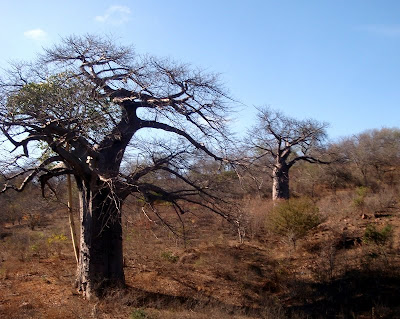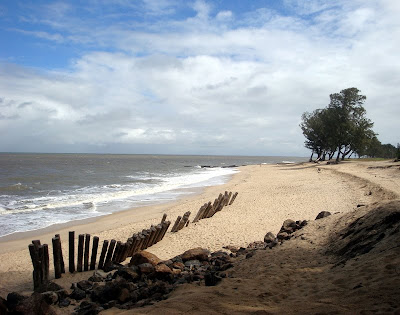A young man dangling out the bus door grabs my tent and backpack and disappears into the bus. Another young man appears and physically places me in the bus, almost like a piece of luggage. It’s completely packed, with people sitting in the aisles. No seats are available, and two men are already sitting on the floor in the front. Before I have time to act, the bus accelerates furiously and I sit in the only spot I can: a cushion next to the other two men in the very front.

The bus keeps accelerating. The sound of the engine is deafening. It’s combined with a high-pitched beeping coming from the dashboard. Just next to the tachometer, a red light flashes in sync with the beep. It reads: STOP. An ominous sign, I think. The men sitting on the floor argue loudly, then start to slap at one another and wrestle a bit.
We are still accelerating down a straight patch of road as I assess the driver. In his early 20s, stocky, and with a shiny shaved head, he grips the steering wheel with two hands and rocks back and forth as he aggressively stares down the road ahead.
The tachometer goes up to 3,000 RPM; the dial is red from 2,400 on up. At this moment, it’s pushing 2,600
The speedometer goes up to 120 kilometers per hour. Right now, the needle is flush against the pin on the other side of 120. A bright red light next to the 120 is illuminated. Another ominous sign, I am sure.
All the while, that shrill red indicator on the dashboard keeps flashing and beeping at the driver: STOP. I could not agree more.
The brakes make a terrible loud hissing noise when they are engaged. I cannot tell whether they are engine brakes, air brakes, or standard pads. If they are pads, they are shot. They do have some effect, but I have no doubt that it would take a great distance to bring this death trap to a halt.
The breakneck speeds don’t keep the driver from yanking the wheel left and right to dodge potholes. We drive partly off the road to avoid some big ones. Oncoming cars or not, we veer into the other lane if that’s the best way to keep all the wheels out of the craters. Cars literally drive off the road when we drive directly at them blasting the horn like maniacs. Each swerve, whether to avoid potholes, bicyclists, pedestrians, or potholes, forces the bus to lean precariously one way or the other.
The driver relentlessly passes every vehicle he encounters. The routine is always the same. Maybe 50 meters before reaching the vehicle, he flashes his lights 5 or more times. Then, he repeatedly blasts an unbelievably loud horn, which sounds just like a train whistle. It’s so loud it drowns out the engine, which is saying something. The driver continues to floor the accelerator until he is extremely close, then he slams on the ineffectual brakes, hesitates a moment, and jerks the wheel to the right (we drive on the left, usually) and floors it again. As we come parallel with the car we are overtaking, the most aggressive staff member (who looks a bit like Tupac Shakur) leans out the bus window and screams at the car, pounding on the outside panel of the bus with his open hand and pointing furiously at the car's driver. This happens over and over and over again.
We pass trucks on hills when we can’t see what’s on the other side. We overtake cars on hairpin turns. I have difficulty fathoming a situation where the driver doesn’t think it’s acceptable to pass.
The road has many speed bumps, called speed humps here, which the driver negotiates much like passing. He accelerates until the last possible second, slams on the brakes, goes over most of the hump, and then floors it again. A few times, I think we nearly go airborne. The main difference between overtaking cars and speed humps is that the staff member doesn’t lean out the window to castigate the humps.
Paralyzed with fear and anxiety, I think to myself: This is how most people in Africa travel? This is insane.
Through the evening sunlight, I can actually see exhaust fumes rising from the floorboards near the driver. Although it’s cool and windy outside, it’s hot as hell in this bus.
A while after I take my place on a cushion, a young staff member in the front left seat -- a single, all by itself, almost as far forward as the driver -- gives it to me. I take it, thinking it’s a mild improvement. It’s not. For one thing, I must straddle the aggressive staff member for the rest of the journey as his shoulders press against my thighs. For another, there is (of course) no seat belt. As far as I can tell, sitting in the front seat guarantees that I will catapult through the windshield upon impact -- and perhaps upon hitting a particularly big speed hump.
Police checkpoints are a sight to behold. It’s then that our staff really shines. With the bus still moving, three of them jump out and hit the ground running. They are yelling at the policeman and waving money at him before our bus even stops, usually behind a few cars. The instant the staff gets the “all clear” from the policeman, they wave at the bus, which usually drives completely off the road to pass the cars ahead of it and barrel through the checkpoint. All three staff members board the bus as it accelerates past. It’s like some sort of bizarre pitstop.
I try to ask how far it is to Dar, but everyone speaks Swahili and nobody knows for sure. It’s getting dark, and I’m hoping it’s just a few more hours.
It’s not.
Darkness falls and we keep up the insane pace. Eventually we hit some steep, winding mountainous sections and even this bus has to slow down. (It still passes other cars, of course.)
Then, the road construction begins. Multiple segments are reduced to one-way traffic, and we sit for 10 minutes at a time waiting for traffic to clear before we’re allowed to proceed. Twice, the staff persuades the flag-bearer who controls access to the road to let us proceed into oncoming traffic, horn blasting and lights flashing. Sometimes we pull off into the construction, sometimes the oncoming traffic would. This stretch lasted for hours.
At a stop, I find an English speaker who tells me that this bus was scheduled to leave at 6 a.m., but the original bus malfunctioned and they had to wait for another one. The whole journey is supposed to be 12 hours. At that point, it had already been 15, and we were nowhere close to done. I am thunderstruck when I hear that we are nearly 400 km from Dar. Impossible. Someone else says 300. Still awful, but that sounds better.
We press on at high speeds. For a couple of hours, until nearly midnight, we seem to make good time. I doze for a bit and wake suddenly and look around. All three staff members are asleep. The driver is shaking his head this way and that and holding his hand out the window. He seems tired as well. I wake the staff members immediately and demand that one of them give the driver a cigarette. (He has been chain smoking for much of the trip. The smoke is actually a welcome change from pure exhaust fumes.)
Then it starts raining.
We slow down a bit and finally reach a city. At a police checkpoint, the staff’s pit-stop routine finally falls short. For some unknown reason, we are not allowed to proceed. We turn around and park in a petrol station. Everyone piles out into the rain and mills about. Someone shows me his cell phone: It’s 12:47 a.m.
I can’t handle proceeding further in the rain. Just as I’m about to wander into the night in search of a place to spend the night, I get word that we’re going to sleep for a bit. The police apparently decided that it was unsafe for us to continue at this hour. Corrupt or not, I will always be deeply grateful to the Tanzanian police for that decision.
We sleep for a few hours. For the third day in four, we resume traveling in the dark of night. The road is fairly flat, the rain has long since stopped, and there’s little traffic on the road. Surely we are less than 100 km from Dar. We’re going to make it!
Then the bus stalls in the middle of the road. We are out of gas.
We slept in a damned petrol station! How could we not fill up? It’s spilled milk now, as we pile out yet again. One more time, I face that terrible fear: Our bus is (of course) sitting in the road on a narrow two-lane highway. It’s getting light, but you never know who’s coming behind you. I get as far away from the bus as possible, but not far enough that a lion might jump out of the bush and eat me. I hope.
The driver and a staff member hitchhike with some empty gas cans. (Here goes one of them.)

Over the next hour, night turns to day. I’m struck by how calm and easygoing everyone is. Some doze in the bus. Many stand outside, chatting and laughing. They have been trying to get home over 24 hours and the driver makes a boneheaded mistake like this -- but they take it in stride.

An hour later, the staff is back. The final stretch into Dar is as hair-raising as the rest of the ride. There’s more traffic, and therefore more cars to overtake and berate. Our driver takes every opportunity. I can’t tell you how many times we forced oncoming traffic off the road while passing.
At long last, we arrive at the bus station in Dar Es Salaam. It is almost 9:00 a.m. on Saturday. I left 89 hours ago, and I was on the road (sometimes sleeping) for 77 of them. A mob of taxi drivers and other hawkers greet me as I, the only white man, leave the bus. I greet them with a big smile and even shake a few hands, happy to be alive.
















































